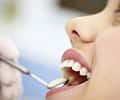The University of Rochester Medical Center explains that paresthesia results from a "traffic jam in your nervous system." This analogy refers to a "roadblock" that's created when constant pressure is on a nerve. This pressure prevents the electric impulses from traveling up and down the nerves as they normally would. Once the pressure is removed, the impulses can travel freely again. But when the blockage is first released, the electric impulses will pick up faster than usual, causing a tingling sensation in the affected area.
However, the tingling you may feel in your tongue is rarely from falling asleep in a strange position or holding your tongue in a particular spot for too long. Let's go over a few things that can cause a tingling tongue.
Nerve Damage After Surgery
Some people get a tingling feeling in their tongue after oral surgery, like a wisdom tooth extraction or a root canal procedure. A case report in the Journal of Dental Anesthesia and Pain Medicine (JDAPM) notes that it will usually occur directly after the procedure for those who do experience paresthesia from oral surgery. In rare cases, a person can have a delayed-onset tingling of the tongue.
Two of the most likely nerves contributing to a tingling feeling in the tongue after oral surgery are the lingual nerve (LN) and the inferior alveolar nerve (IAN). The JDAPM notes that IAN paresthesia occurs in 0.35 to 8.4 percent of people who undergo oral surgery.
If you've recently had oral surgery and have noticed that your tongue feels tingly, don't worry. Most paresthesia cases due to oral surgery disappear on their own within a few months at the latest. You should schedule a visit with your dental professional if you are particularly concerned about the sensation or if it has lingered for longer than a few months.
Oral Allergies
While many of us may not be aware of every type of substance we could be allergic to, there's an interesting relationship between the allergy to certain pollens and a tingly or itchy tongue you may want to be aware of. The American Academy of Allergy, Asthma, and Immunology reports that up to three-quarters of adults with a birch pollen allergy also have oral allergy syndrome. One of this syndrome's symptoms is a tingling and itchy tongue after eating certain raw fruits and vegetables, such as apples, peaches, cherries, and carrots. If you have oral allergy syndrome, your best bet to avoiding a tingling tongue is to eliminate from your diet the raw fruits and vegetables that can trigger an allergic reaction.
Canker Sores on the Tongue
You may be familiar with canker sores, a prevalent oral condition of small, white swellings that aren't contagious but can be a nuisance. They can develop almost anywhere on the soft tissue inside the mouth, including the lips, cheeks, soft palate, and tongue. While canker sores' exact cause is unknown, risk factors range from genetics to a weakened immune system to smoking cigarettes.
As noted by the Mayo Clinic, a tingling or burning sensation in your mouth and tongue can develop a couple of days before the sore itself is visible. This means you may be able to tell when a canker sore is coming on! Canker sores may be painful, but they usually clear up on their own and don't require treatment. If you notice your canker sores are large or don't clear up within two weeks, schedule an appointment with your medical professional. They can evaluate the sore and discuss your treatment options.
"Hypo" Causes of a Tingling Tongue
A tingling tongue means that you are missing one of the substances your body needs to thrive. For example, low blood sugar and low calcium levels can be the cause of your tongue's paresthesia. There are two important things worth noting about "hypo" causes of a tingling tongue:
- A "hypo" cause of a tingling tongue is relatively rare.
- If a deficiency in blood sugar or calcium is the cause of paresthesia, this tingling sensation does not occur until your calcium or blood sugar levels are severely low. It's essential to note that tingling and numbness in the tongue, lips, or cheeks are some of the more severe signs of low blood sugar. And Merck Manual connects tingling in the tongue with tetany, an involuntary contraction of the muscles that often develops when calcium levels are deficient.
Working with your doctor to manage the situation can help you avoid a tingling tongue and other complications. This is especially true if you have a condition that causes low calcium levels or diabetes, which is the usual reason for a dip in blood sugar. In most cases, a tingling sensation is nothing to worry about. But we always advocate for immediate professional care if you are experiencing a symptom of diabetes. This will ensure that you are fully knowledgeable about the signs and symptoms of a diabetic blood sugar low. You deserve to be confident in your oral and overall health. That's why education and open conversations with your medical professionals is vital!
While there's a wide range of possible reasons for your tingling tongue, you don't need to panic! Consider what you already know about your body and current health. Did you recently have oral surgery? Have you experienced cold sores in the past? Are you diagnosed with diabetes? Discussing your health and diagnoses with a dental or medical professional can help them figure out why you are experiencing a tingling tongue and get you on the correct treatment path if necessary.
Oral Care Center articles are reviewed by an oral health medical professional. This information is for educational purposes only. This content is not intended to be a substitute for professional medical advice, diagnosis or treatment. Always seek the advice of your dentist, physician or other qualified healthcare provider.
ORAL HEALTH QUIZ
What's behind your smile?
Take our Oral Health assessment to get the most from your oral care routine
ORAL HEALTH QUIZ
What's behind your smile?
Take our Oral Health assessment to get the most from your oral care routine
Join Us
Get the best of your oral health routine and take it to the next level with expert advice, recommendations, products and solutions and special offers.
Join Us
Get the best of your oral health routine and take it to the next level with expert advice, recommendations, products and solutions and special offers.















